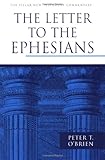
Peter O’Brien has earned himself the reputation of being a fine scholar and commentary writer, specialising in the Prison epistles, having written highly acclaimed volumes on Philippians for the New International Greek Testament Commentary and Colossians and Philemon for the Word Biblical Commentary. This work on Ephesians thus completes the set, and although the Pillar Series isn’t as technical as the other series he has written for, this is by no means a basic level commentary.
It weighs in at 500 pages of commentary, 80 of which are devoted to the introduction. This is perhaps longer than might be expected for this series, but a good deal of this is given to providing a robust defence of Pauline authorship. Andrew Lincoln (author of the Word Biblical Commentary on Ephesians) is his main sparring partner, and he sets out Lincoln’s argument in detail before responding point by point. His thorough argument firmly puts the burden of proof back onto the doubters. He also takes some time to express serious misgivings about the validity of the rhetorical approach of interpretation taken by some commentators.
The commentary proper follows broadly the same format as the other Pillar volumes, and includes the text of Ephesians in the NIV. I would have preferred his own translation though, as in a number of places he favours significantly different sentence constructions. Each section and subsection of the book has a summary introduction outlining the flow of argument that will follow. Comments are then provided on one or occasionally two verses at a time. Sections are usually ended with another summary of the flow of argument often highlighting how the themes in the section under consideration fit with the rest of the book. There are six chapters of commentary – one for each of the chapters of Ephesians.
The long sentences of Ephesians 1 mean that fairly technical discussions of Greek grammar are inevitable, but O’Brien manages well to keep it from becoming inaccessible to the non-specialist. Any Greek is both transliterated and translated, although the footnotes contain Greek font but still provide a translation. Where a phrase has been interpreted in many different ways, O’Brien takes time to enumerate the main options before revealing his own preference.
O’Brien writes from a conservative evangelical perspective, and while he rarely preaches (preferring to let Paul do the preaching), he shows concern for contemporary application. The contentious section on wives in chapter 5 is given extra space to allow him to defend a traditional complimentarian position, but attempting to address some concerns that egalitarians may have with this approach. He believes Grudem’s paper rejecting the translation of kephale as ‘source’ rather than ‘head’ is decisive, and so this part of the debate is largely left to the footnotes.
Having said this, he does not feel the need to weigh in on every modern theological debate. For example the reader will only find hints of what he believes about “apostles for today” or “spiritual warfare techniques”, without explicitly mentioning the views he rejects.
Although the main discussion of Pauline authorship is confined to the introduction, where relevant O’Brien does make additional points, particularly with regards to the supposed “over-realised eschatology” of the author. O’Brien’s contention is that the theology of the letter fits well with Paul’s other writings and he demonstrates this wherever possible.
Ephesians is a book that is rich in both theologically and practical application. In this commentary O’Brien does a fine job of revealing Paul’s meaning as well as his flow of thought. The section on the familiar 2:8-10 is outstanding, and his careful exegesis sheds much light on some of the difficult to understand passages (e.g. 3:14-19 and 5:13,14). This is a commentary best suited to those who want to do some research for teaching of their own, and seems set to be the standard evangelical Ephesians commentary for some time to come. I highly recommend it to all Bible students or teachers.
